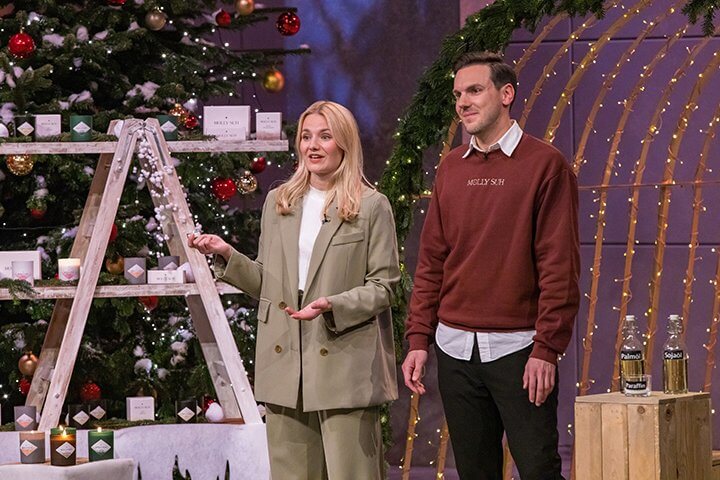Molly Suh and the dreaded corporate argument #DHDL
Almost everyone who has ever been to a pitch event where there was also a kind of jury knows the question: what would the small start-up do if a corporate giant decided to copy their product? But is there a clever answer?
Friday,
15.12.2023

In the Christmas episode of “Die Höhle der Löwen”, the founding couple of Molly Suh had to experience what has happened to so many founders time and time again long before the programme even existed: they presented their products and their sustainably produced tea lights and scented candles were also pretty well received by the lions.
But then the questions and comments from the TV investors very quickly turned to the USP and the question of how they could assert themselves against the seemingly overpowering competition from large corporations if they were to copy the product. After all, they are also increasingly focussing on sustainability and the Molly Suh products would not be protectable across the board.
In fact, a property right is and remains – albeit often unfortunately very expensive – one of the strongest weapons for young and small companies against large corporations that simply want to copy a successful product because they themselves have once again missed out on innovation.
This is why patents and utility models in particular, but also other types of property rights, are highly valued in investor negotiations and are usually reflected in the valuation.
However, if this is not possible – after all, not every product can be protected in any way, even if it represents a genuine innovation overall – there is often great fear of being copied by market players with large marketing budgets. The prevailing opinion seems to be that they will copy anything that could be successful. And simply roll over the small, innovative start-ups with big dreams.
In the tech industry, it was Google for a long time. Whenever a startup pitched an app or platform, there always seemed to be some smart guy asking the question: What if Google copies this tomorrow?
Pitch coaches are often asked what the smart answer to this question is. The thing is: you can’t give a clever answer to a question that isn’t particularly clever in itself. Because honestly, what happens when Goliath copies David’s slingshot? Exactly, he now probably has the much more blatant weapon and David can just wish for a quick death. At least that’s how it seems.
Even the Molly Suh founders had to admit that this was a major challenge. Nevertheless, they are doing quite well, as they remain true to their strategy despite critical questions and emphasise that they do not see themselves as a supermarket, but rather want to serve their customers online and target business customers such as hotels and restaurants. They want to remain in the high-quality, mid-price segment and have chosen the right channels for this.
This does not suit Tillman Schulz, and hotel expert Dagmar Wöhrl also sees it as difficult to raise the brand’s profile enough to convince the relevant B2B customers. For Nils Glagau, the USP is not strong enough.
However, conscious consumers can be persuaded in a very targeted and effective way, especially online. Quite a few sustainable brands have already shown that they can manage with relatively low customer acquisition costs if they use targeted ads and the right influencers to attract customers. Affiliate programmes can also work very well here. It is possible to build a brand from a niche if you can convince your customers in the long term.
And indeed, this customer segment in particular, for which the “LoHaS” categorisation of the Sinus-Milieus is often used, has a certain tendency to look for new favourite sustainable brands. This “lifestyle of health and sustainability” of a higher-earning segment of the population often cannot be presented credibly by large companies. As a result, well-known brands in particular have a difficult time with their sustainable product versions in this segment and often prefer to position themselves in the lower price segment – this tends to appeal to customers who want to soothe their conscience but are not prepared to spend substantially more money. However, they are also not quite as precise when it comes to sustainability.
In fact, many large corporations have already experienced in the past that the sustainability brand they have just bought up, which is very popular with consumers, suffers an extreme loss of trust as soon as the purchase becomes known. Quite a few have already miscalculated decisively here.
The example of Nestle and Ankerkraut also illustrates what can happen when the “wrong” company in the eyes of consumers becomes the new owner: it is not the company that improves its image, but the image of the acquired brand that appears to lose.
Of course, it is still difficult for a small start-up to compete for customers’ favour alongside the top dogs. But David has something that Goliath has long since lost: the chance to link his name with consumer confidence in genuine sustainability. In Goliath’s hands, his greatest weapon immediately loses its effectiveness: it becomes smaller, less targeted, less dangerous. But in David’s hands, the slingshot is all the more effective when it hits the right spot.
Ralf Dümmel seemed to see it the same way, and so his 75,000 euros and his sales power will give Molly Suh’s slingshot the chance to hit corporate Goliath very hard. A Christmas miracle that the likeable couple would very much like to see.
Photo (above): TVNOW / Bernd-Michael Maurer

Ruth Cremer
Ruth Cremer is a mathematician and consultant as well as a university lecturer in the field of business models, key figures and financial planning. As a former investment manager, she knows what investors look for and also helps with pitch and document preparation in the investment or acquisition process. Since 2017, she is involved as an external consultant in the selection and preparation of the candidates in "Die Höhle der Löwen".
